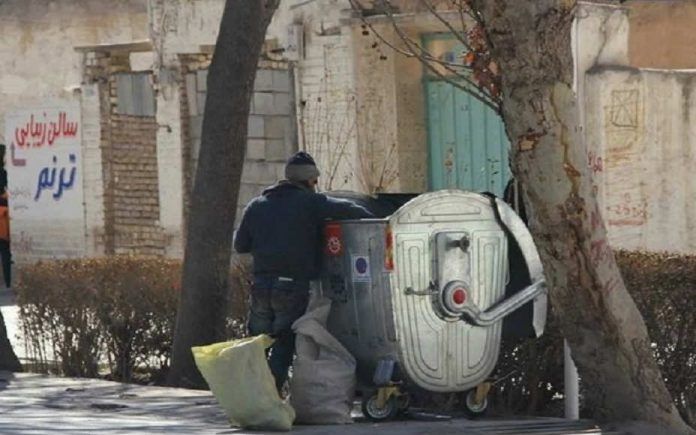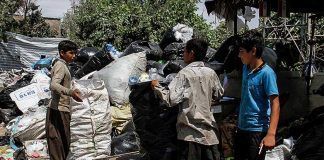By Reza Hamidi
The COVID-19 lockdown has had a devastating impact on the ailing Iranian economy, forcing many businesses to reduce their workforce significantly. Many workers who lost their jobs when the government ordered factories and other businesses closed could not find other work. As a result, many have reportedly been forced to make a living by selling items that they have recovered from trash bins and dumpsites, a practice known as urban foraging, or dumpster diving, or bin raiding.
Many workers at Fasa Sugar Factory in the southwestern province of Fars, who were owed seven months in back wages by the time the plant shut down, have been engaging in urban foraging and selling car tires to make ends meet, the Iranian Labor News Agency (ILNA) reported on April 28.
According to ILNA, the authorities have imprisoned the owner of Fasa for the second time. Unable to collect their back wages, many workers have migrated to other regions in search of work. The workers at Fasa had held a dozen protests last year in front of the governor’s office and other government buildings in the province, demanding their wages and rights.
Although the authorities ultimately arrested the managing-director of Fasa after the company failed to fulfill its legal and financial obligations, the workers were never paid their back wages. Also, the company has not paid the wages of 300 workers who still work for Fasa, ILNA added.
Hadi Mahdoud, a member of the workers’ union at Fasa, told ILNA: “[Company] officials keep telling us everything will be fine, and they will pay the salaries and wages of all workers, but nothing has happened yet.”
“Putting the managing director in jail does not solve the problem, given most of the workers at Fasa have not been paid since October 2019,” Mr. Mahdoud noted. “Recently, officials at Fasa sold some equipment, scrap iron, and the orange trees on the company’s premises to generate cash and pay some salaries. There are still 140 workers who have not received their wages for months.”
“Most of the workers who were laid off could not find other jobs,” Mahdoud explained. “They and their families live only on their meager state cash subsidies. Many of them are making a living by raiding bins and selling used tires and everything else they can find in dumpsters.”
Another worker at Fasa, who wished to remain anonymous, told ILNA: “Many workers have moved to other provinces and cities in search of work including Kerman, Bandar Abbas, and Yazd.”
Hossein Argiuo, the governor of Fasa County, told ILNA: “The company shut down two months ago. Authorities arrested and imprisoned the owner for failing to pay his workers, beetroot growers, farmers, drivers, and Iran’s Grain Organization.”
Meanwhile, some officials have warned against the health hazards of urban foraging and collection of trash by unauthorized people who do not adhere to health and hygiene rules practiced by regular sanitation workers.
“We have seen an alarming increase in the number of people foraging at dumpsites since the outbreak of coronavirus,” Mr. Azimi, the director of the Waste Management Office for the northeastern province of Khorasan Razavi, told the Iranian Students News Agency (ISNA) on April 27. “Hospital waste in the province was around 2 tons before the outbreak, but it has now increased to 2.6 tons.”
“While hospital waste is made safe before being transferred to a dumpsite, household and commercial trash are not processed, which is a major source of concern to us,” Azimi noted. “The trash may come from a household where someone is sick with COVID-19, which could pose a serious health risk to the public.”
“City workers stopped separating the trash at the point of the collection after the coronavirus outbreak,” Azimi explained. “They will go back to doing that, given an increasing number of people are dumpster diving. The city’s sanitation workers carry their IDs with them and are being trained in the new and safer ways of collecting and separating trash. They will also wear protective gear, including masks and gloves.”
“People who go through bins without proper training and equipment are putting themselves and others at risk,” Azimi warned.
This article was translated and adapted from Persian by Fardine Hamidi.






